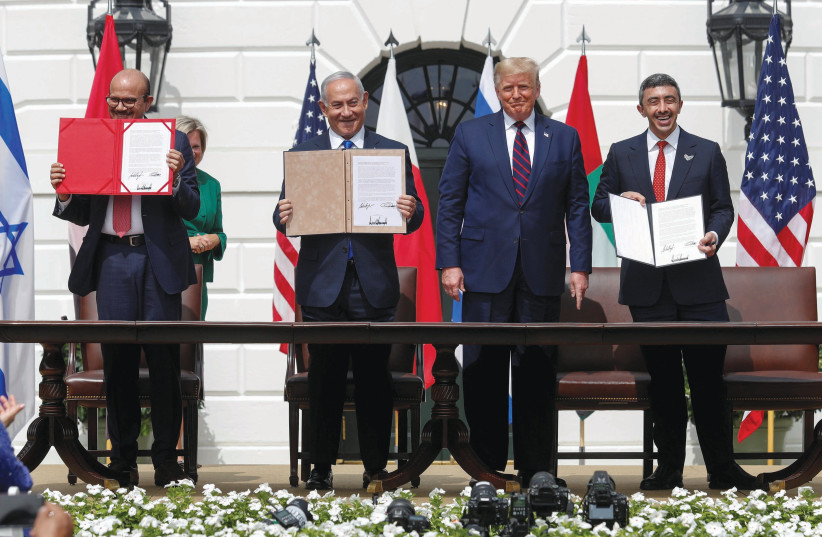Knesset Speaker Amir Ohana headed to Morocco on Wednesday. As in any such trip, he is expected to meet with his Moroccan counterpart, Rashid Talbi al-Alami, and the Israel-Morocco parliamentary friendship group; to sign a memorandum of understanding on cooperation between the two legislatures; and to meet with members of Morocco’s Jewish community.
But this is not a trip like any other.
As Knesset speaker, Ohana is considered the third-most senior government figure in Israel, following the president and prime minister. While several other ministers have visited Morocco in the past two-and-a-half years, Ohana is the highest-profile visitor from Jerusalem to Rabat since the renewed normalization of ties in December 2020 – and the first head of Israel’s legislature to be invited to a Muslim state.
Israel and Morocco have had a long history of both secret and open ties. In the 1960s, Moroccan King Hassan II gave Israel recordings of an Arab League meeting that helped Jerusalem prepare for the Six Day War. The countries exchanged liaison offices following the Oslo Accords, which marked the start of open, though not full, relations between the countries. That ended in 2000, after the Palestinians launched the Second Intifada.
In recent years, Israel and Morocco have had a shared interest in countering threats from Iran, which aims to destroy the Jewish state and funds rebels in Western Sahara. Israel sold drones and cybersecurity services to Rabat even before relations were officially normalized.

The revival of ties, which followed the Abraham Accords between Israel and the UAE and Bahrain, brought even more robust relations, with the reciprocal opening of embassies. In addition, direct flights were launched between Israel and Morocco. Though there are mixed feelings among the Moroccan public – Morocco is a somewhat freer state than the other Abraham Accord countries, and its parliamentarians are able to express opposition to various policies – King Mohammad VI has stood firmly behind his groundbreaking decision to fully normalize relations with Israel.
Since then, the two countries have signed the first defense memorandum of understanding between the Jewish state and an Arab country, and earlier this year, the Royal Moroccan Armed Forces said that the countries plan to “further strengthen cooperation and expand it to other areas, including in intelligence, air defense and electronic warfare.” This week, the IDF sent soldiers for the first time to participate in “African Lion,” a US-led military exercise in Morocco.
“The dream of peace with Muslim states beats in our hearts forever.”
Amir Ohana
Why Israel's ties with Morocco are of such importance
These ties have great potential, as Morocco, with a population of 36.5 million, is influential in both the Arab world and Africa, and has one of the strongest economies on the continent. Israel’s expertise in solar energy and agricultural technology are additional areas where the ties could flourish.
There are more than a million other reasons why relations between Jerusalem and Rabat are important: the more than one million Israelis – including Ohana – who trace their roots back to Morocco. The trip takes on greater significance because of Ohana’s family history, since his parents were born in Morocco – his father grew up in Rabat – and moved to Israel in the 1950s. He is also the first Israeli of Moroccan origin to become Knesset speaker.
Unlike some other aliyah waves, Moroccan Israelis tend to view their country of origin, and the king of Morocco in particular, positively. Moroccan Jewish culture has spread throughout Israel – whether it’s the food, the music or the special Mimouna celebration after Passover – and the reestablishment of relations sent a wave of excitement throughout the Jewish state. Tourism from Israel to Morocco has spiked since then.
“The dream of peace with Muslim states beats in our hearts forever,” Ohana said when he announced the visit. “It is so suitable that of all of these countries, it is the Kingdom of Morocco that was first to invite... the head of the legislative branch of the State of Israel, who is the first of Moroccan origin in this job, for an official visit to its parliament.”
Ohana was not exaggerating when he said that “history is happening before our eyes.” His visit is a meaningful and significant one in the strengthening of ties between Israel and a key Muslim state in the region.
